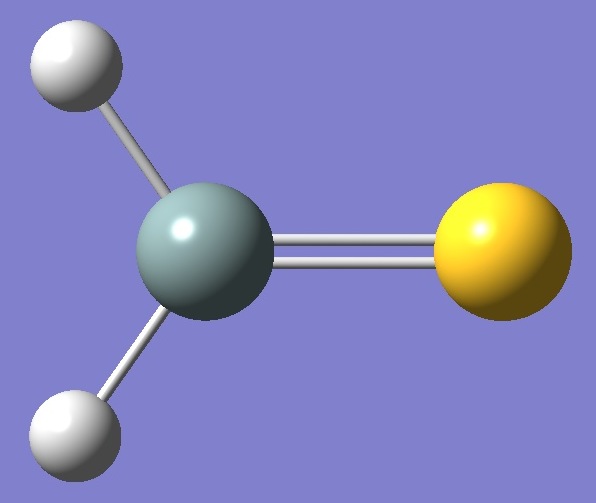|
|
|
|
|
|
|
|
|
|
|
|
|
|
|
|
|
|
|
|
|
H2Si=S |
|
|

|
|
|
|
|
|
|
|
|
|
|
|
|
|
|
|
|
|
|
|
|
|
|
|
|
|
|
|
|
|
|
|
Deuterium |
|
|
|
Nuclear
Quadrupole Coupling Constants |
|
|
|
in
Silanethione |
|
|
|
|
|
|
|
|
|
|
|
|
|
|
|
|
|
|
|
|
|
|
|
|
|
|
|
|
|
|
|
|
|
Calculation was made here of the D
and 33S nqcc tensors on the semi-experimental equilibrium
structure
of Thorwirth et al. [1]. These are compared with the (limited)
experimental values [2] in Tables 1 and 2. |
|
|
|
|
|
|
|
|
|
|
|
|
In Table 1, subscripts a,b,c refer to
the principal axes of the inertia tensor, subscripts x,y,z to the
principal
axes of the nqcc tensor. The a-axis is coincident with the
twofold
symmetry axis. The nqcc y-axis is chosen coincident with the
inertia
c-axis, which is perpendicular to the plane of the molecule.
Ø
(degrees) is the angle between its subscripted parameters. ETA =
(Xxx
- Xyy)/Xzz. |
|
|
RSD is the calibration residual
standard deviation for the B3LYP/6-31G(df,3p) model for calculation of
the nqcc's, which may be taken as an estimate of the uncertainty in the
calculated nqcc's. |
|
|
|
|
|
|
|
|
|
|
|
|
|
|
|
|
|
|
|
|
|
|
| |
|
|
|
|
|
|
|
|
Table 1. Deuterium nqcc's
in D2Si=S (kHz). Calculation was made
on the rese structure [1]. |
|
| |
|
|
|
|
|
|
|
|
|
|
|
Calc. |
|
Expt. [2] |
|
| |
|
|
|
|
|
|
|
|
2H |
Xaa |
|
- 2.0 |
|
|
|
|
|
Xbb |
|
48.4 |
|
70.2(30) |
|
|
|
Xcc |
- |
46.4 |
|
|
|
|
|
Xab |
± |
67.4 |
|
|
|
|
|
|
|
|
|
|
|
|
|
RSD |
|
1.1 (0.9 %) |
|
|
|
|
|
|
|
|
|
|
|
|
|
Xxx |
- |
48.8 |
|
|
|
|
|
Xyy |
- |
46.4 |
|
|
|
|
|
Xzz |
|
95.2 |
|
|
|
|
|
ETA |
- |
0.026 |
|
|
|
|
|
Øz,a |
|
55.24 |
|
|
|
|
|
Øa,SiD |
|
55.16 |
|
|
|
|
|
Øz,SiD |
|
0.08 |
|
|
|
|
|
|
|
|
|
|
|
|
|
|
|
|
|
|
|
|
|
|
|
|
|
|
|
|
|
|
|
|
|
|
| |
|
|
|
|
|
|
|
|
|
|
Table 2. 33S
nqcc's in H2Si=S (MHz). Calculation was
made on the rese structure [1]. |
|
| |
|
|
|
|
|
|
|
|
|
|
|
|
[a] B3LYP/6-311G(3df,3p) model. |
|
|
|
|
[b] B3LYP/TZV+(3df,3p) model. |
|
|
|
|
|
|
|
|
|
|
|
|
|
|
|
Calc [a] |
|
Calc [b] |
|
Expt. [2] |
|
| |
|
|
|
|
|
|
|
|
|
|
33S |
Xaa |
|
- 9.94
|
|
- 9.96 |
- |
9.5077(40) |
|
|
|
Xbb |
|
26.44 |
|
26.55 |
|
|
|
|
|
Xcc |
- |
16.50 |
- |
16.58 |
|
|
|
|
|
|
|
|
|
|
|
|
|
|
|
|
|
|
|
|
|
|
|
|
|
|
|
|
|
|
|
|
|
|
|
|
Structure parameters, rese
[1] |
Si=S = 1.9357(1) Å |
|
|
|
|
|
|
SiH = 1.4735(1) Å |
|
|
|
|
|
|
HSH = 110.33(1)o |
|
|
|
|
|
|
|
|
|
|
|
| |
|
|
|
|
|
|
|
|
|
|
[1] S.Thorwirth, J.Gauss,
M.C.McCarthy, F.Shindo, and P.Thaddeus, Chem.Comm. 5292(2008). |
|
|
[2] M.C.McCarthy, C.A.Gottlieb,
P.Thaddeus,
S.Thorwirth, and J.Gauss, J.Chem.Phys. 134,034306(2011). |
|
|
|
|
|
|
|
|
|
|
|
|
|
|
|
|
|
|
|
|
|
|
H2O |
H2C=O |
H2C=S |
H2Si=O
|
|
|
|
|
|
|
|
|
|
|
|
|
|
|
|
|
|
|
|
|
|
|
Table of Contents |
|
|
|
|
|
Molecules/Deuterium |
|
|
|
|
|
|
|
|
|
|
|
|
|
|
|
|
|
|
|
|
|
|
|
|
|
|
|
|
|
|
H2SiS.html |
|
|
|
|
|
|
Last
Modified 16 Feb 2009 |
|
|
|
|
|
|
|
|
|
|
